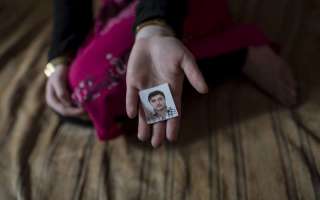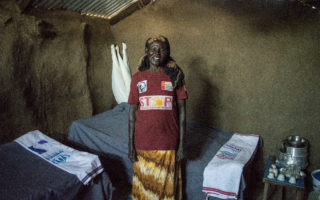
Alicia was sexually abused at the age of 18. Ten years later she was displaced after witnessing an assassination and began receiving death threats. Alicia didn’t know how to access her basic rights, but having found The Alliance of Women Life Weavers she now participates as a women’s rights activist. © UNHCR/Ruben Salgado Escudero
As the coronavirus pandemic prolongs, a lethal mix of confinement, deepening poverty and economic duress is unleashing a renewed wave of violence against refugee, displaced and stateless women and girls, UNHCR, the UN Refugee Agency, is warning today.
“We are receiving alarming reports of sharp increases in the risks of gender-based violence, including intimate partner violence, trafficking, sexual exploitation, and child marriages,” warned UN High Commissioner for Refugees, Filippo Grandi.
The UNHCR-led Global Protection Cluster, a network of UN agencies and NGOs providing protection to people affected by humanitarian crises, reported increases in gender-based violence in at least 27 countries. The sale or exchange of sex as an economic coping mechanism was also reported in at least 20 countries.
In North-West and South-West Cameroon, where the security situation remains volatile, a staggering 26 per cent of gender-based violence incidents logged since the onset of the pandemic relate to children. In the Central African Republic, where a quarter of the population is displaced, one gender-based violence incident is recorded every hour, an estimate based on figures from the humanitarian alert system, which covers 42 per cent of the country.
Gender-based violence incidents affecting Venezuelan refugees and migrants in Colombia have increased by 40 per cent over the first three quarters of the year, when compared to the same period last year. Calls to domestic violence hotlines have also increased by 153 per cent in Colombia and 56 per cent in Zimbabwe.
In Cox’s Bazar, Bangladesh, 42 per cent of Rohingya male and female refugees surveyed in a humanitarian assessment said that it had become more unsafe for women and girls ‘inside the house’ since the onset of the COVID-19 crisis. Participants in the assessment described an increase, in particular, of intimate partner violence, resulting from tensions over containment measures, movement restrictions and financial difficulties.
UNHCR is also alarmed by increased risks of child and forced marriages being resorted to as a coping strategy by displaced families buckling under socio-economic pressures. Many countries experiencing conflict or displacement already have some of the world’s highest rates of these incidents.
“With COVID’s socio-economic impact driving millions of refugees and displaced people further into poverty and destitution, we are extremely worried about the increase in violence against women and girls,” said Grandi.
“Jobs have been lost, tensions are rising, intimate partner violence is escalating, livelihood opportunities are scarce and movement restrictions are making it difficult for survivors to report abuse and seek help.”
Echoing this year’s UN theme for the 16 Days of Activism in promoting action to fund, respond, prevent and collect data to end gender-based violence, UNHCR is urging donor support to preserve and boost essential prevention and response services.
Gender-based violence services including psycho-social support, specialized health services and safe shelters, are lifesaving and must be maintained as essential during COVID-19 lockdowns.
Addressing gender-based violence requires a concerted response involving national authorities, humanitarian partners, civil society and forcibly displaced women, girls, men and boys themselves.
Reaffirming its own commitment to addressing gender-based violence across all its operations, UNHCR launched an institution wide policy on its prevention, risk mitigation and response, in October this year. More information on UNHCR’s work and interventions amid the pandemic is available here.
For more information on this topic, please contact:
- In Geneva, Shabia Mantoo, mantoo@unhcr.org, +41 79 337 76 50
- In New York, Kathryn Mahoney, mahoney@unhcr.org, +1 347 443 7646
Originally published by UNHCR on 25 November 2020.





